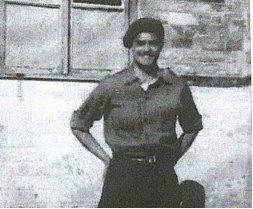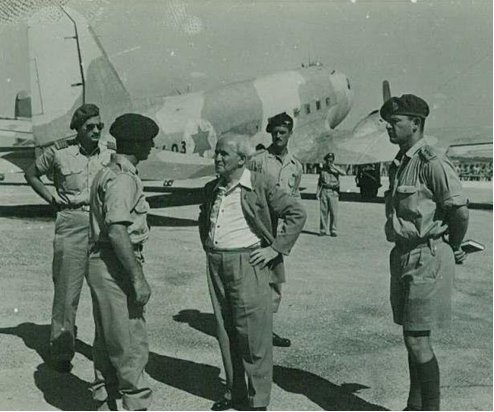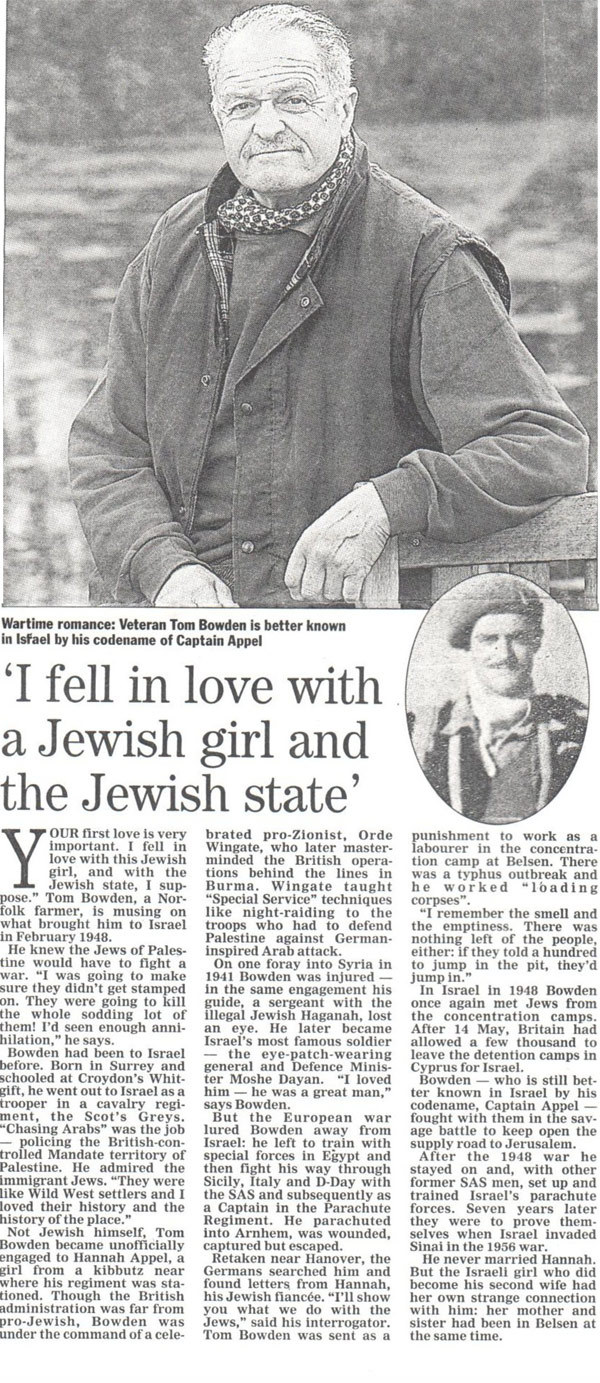Remembering Tom Derek Bowden – Haaretz 4.7.2019
Nom de guerre CAPTAIN DAVID APPEL
 The English-speaking Machal boys of the “B” company of the 72nd Battalion Infantry will never forget Captain David Appel.
The English-speaking Machal boys of the “B” company of the 72nd Battalion Infantry will never forget Captain David Appel.
The seventh of nine children of a prosperous South London family (the best-selling product of the family business was Ribena), he left school at 15, eager to play a part in the war he saw coming.
Bowden’s own religious knowledge was negligible, formed by an easy-going Church of England background, and he knew nothing of Zionism. But his affinity with the Jewish community had been forged through participation in Jewish life in London, with its lively parties, dances and furious debate. This connection was reinforced while serving in the Royal Scots Greys Cavalry regiment, when he was sent to Mandate Palestine to fight on horseback, armed with a saber and a First World War rifle, and enhanced by his experience as a prisoner of war in World War II.
Something of a daredevil, he was deeply impressed by Orde Wingate, the Bible-thumping captain; Bowden attended one of his famous courses on counterterrorism.
At the outbreak of war, he went back to England and then returned to Palestine – with a commission and 30,000 horses. The regiment went into Syria when it declared allegiance to Vichy France in 1942, cavalry charging cavalry in what he calls “an operatic battle,” complete with swords and swirling red cloaks.¹
During the battle, Bowden’s leg was badly wounded and he spent three months recovering in a Jerusalem hospital.¹ After discharge from hospital, Derek recuperated at the home of the Appel family in Tel Aviv, and after that used the surname Appel.
The winter of 1942 was bitterly cold and it even snowed. The regiment was mechanized and the horses were put down. Bowden volunteered for a parachute brigade being recruited near the Suez Canal.
After training, his job was to drop flares ahead of parachute landings along the North African coast and in occupied Europe. At Arnhem his leg was injured again and he was captured and taken to a POW camp hospital near Hanover.
After escape and subsequent recapture, he was interrogated. He was found to have diaries and letters from Jewish friends and girlfriends in Palestine in his possession. “I knew I shouldn’t have, but I didn’t want to part with them,” he declared.
The SS officer who questioned him had until then treated him well, offering him drinks and cigarettes. “When he saw the papers, he told me he would show me how the Germans treated the Jews. I was sent for a month to Bergen-Belsen.”
He said it was an experience which changed his life. He spent the month carrying corpses from the shocking living quarters, piling them onto carts and tipping them into pits. After that he was returned to Hanover.
The war ended and he was released. He resigned his commission but couldn’t settle down again. He went to Yugoslavia to look for work and started a parachute school there. While he was there when he heard of Israel’s Declaration of Independence and sailed and flew via Cyprus to Haifa. He picked the nom de guerre David Appel after the name of a previous fiancé, Hannah Appel, and “… because I could write it.”
At first he joined the 7th Brigade, surviving the Latrun operations and continuing to fight with the brigade as it battled its way through the Galilee.
In 1949, after the armistice, he was asked by Chaim Laskov, a founder of the Israel Defense Forces, to start a parachute school. Helped by his Jewish secretary, Eva Heilbronner, he wrote Israel’s first training manual, consulting rabbinical scholars for Hebrew translations of new technical terms. As commander and chief instructor of Israel’s first parachute regiment, Bowden brought army surplus parachutes from England and made four jumps ”before breakfast every day.”

Far left: American pilot Bill Katz; Ben-Gurion; Derek Bowden,1st commander of the Paratrooper School, behind Ben-Gurion. Far right – Haim Laskov,Head of Training Command of Army at Tel Nof Air Base. Gershon Yuval, CO of Administration Wing of the Paratrooper Training School is talking to Ben-Gurion.
He eventually left in 1950, having married Eva. They have four children, and though were later divorced, they still meet often. Speaking in the garden of his rambling old Norfolk farm house, he recalls without rancor the chaos, lack of organization, and the Israeli propensity for holding endless meetings.
In the garden stands a light airplane he still flies. Inside the house are faded photos, insignia, wings, memorabilia – and a tattered first edition of the Hebrew training manual.
Derek Bowden’s recollections in a letter to Joe Woolf sent in 2006:
When Chaim Laskov told me to start a new school, I went to visit the old unit which had a place up in the pines at Ahuza. They had been there since 1948 – a company, and had done some jumps. There were Americans, Belgians and French, and all were given the chance to come down to the new place at Tel Nof. Only one, Charlie Bortz (101st American Airborne Division) came. In addition we had Abraham Erlich who later went on to command a battalion in the new Paras. and was made an aluf.
I regret I was only able to have a brief visit to disband the old unit and did not really know the old guys well. Incidentally, I met Eva (Chava) my wife there. She was the nurse in the old unit, and became my secretary at Tel Nof. Captain Norbert Benchemoul (now in the South of France) was the intelligence officer.
The old unit had company strength and was well equipped in those days, with jeeps, Bren guns, and so on, and they’d erected a steel tower some 100 feet high for Omega training. I was never told why it was to be disbanded as it was a dedicated unit with very keen chaps.
Steps had already been taken however and about a dozen recruits were sent away to instructors school (general) to form my first cadre of instructors at the new school. I think the idea was to abandon all “foreign” (Machal) influence as soon as possible and to make the new unit 100% Israeli (I was the exception). Remember the whole army was in the throes of reorganization and even the Palmach had been absorbed into the army.
Sorry not to be more helpful about the American Sheldon Erlich. Tel Nof did not exist and there were many starts and stops. Sometimes two different decisions were made in one week, No and No, and then Yes, to the idea. I even came back to the 7th Brigade at one time, as there was a negative attitude until at last we got a camp at Tel Nof. It was very badly equipped and quite impossible to do much quickly. I built the camp myself, including all the swings and equipment and I had no engineering qualifications at all. Luckily the instructors didn’t know that.
David Appel (Derek Bowden)
Sources:
1. South Africa’s 800, Henry Katzew
2. A 1993 interview and article in the Jewish Chronicle, UK
3. Private correspondence between Bowden and Machal researcher Joe Woolf
¹ In this same clash, the famous Moshe Dayan had lost his eye when a bullet hit the telescope he was using and crushed the eye socket.

Join Simon Barrett for a special Middle East Report to mark the 70th Anniversary of the nation of Israel. His guest Derek Bowden is a 96-year-old World War Two hero.

